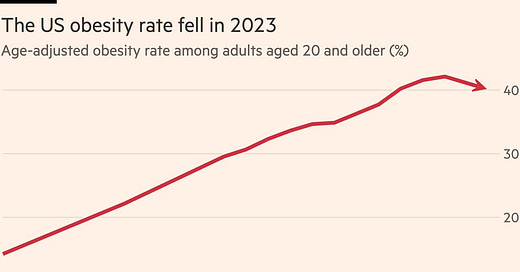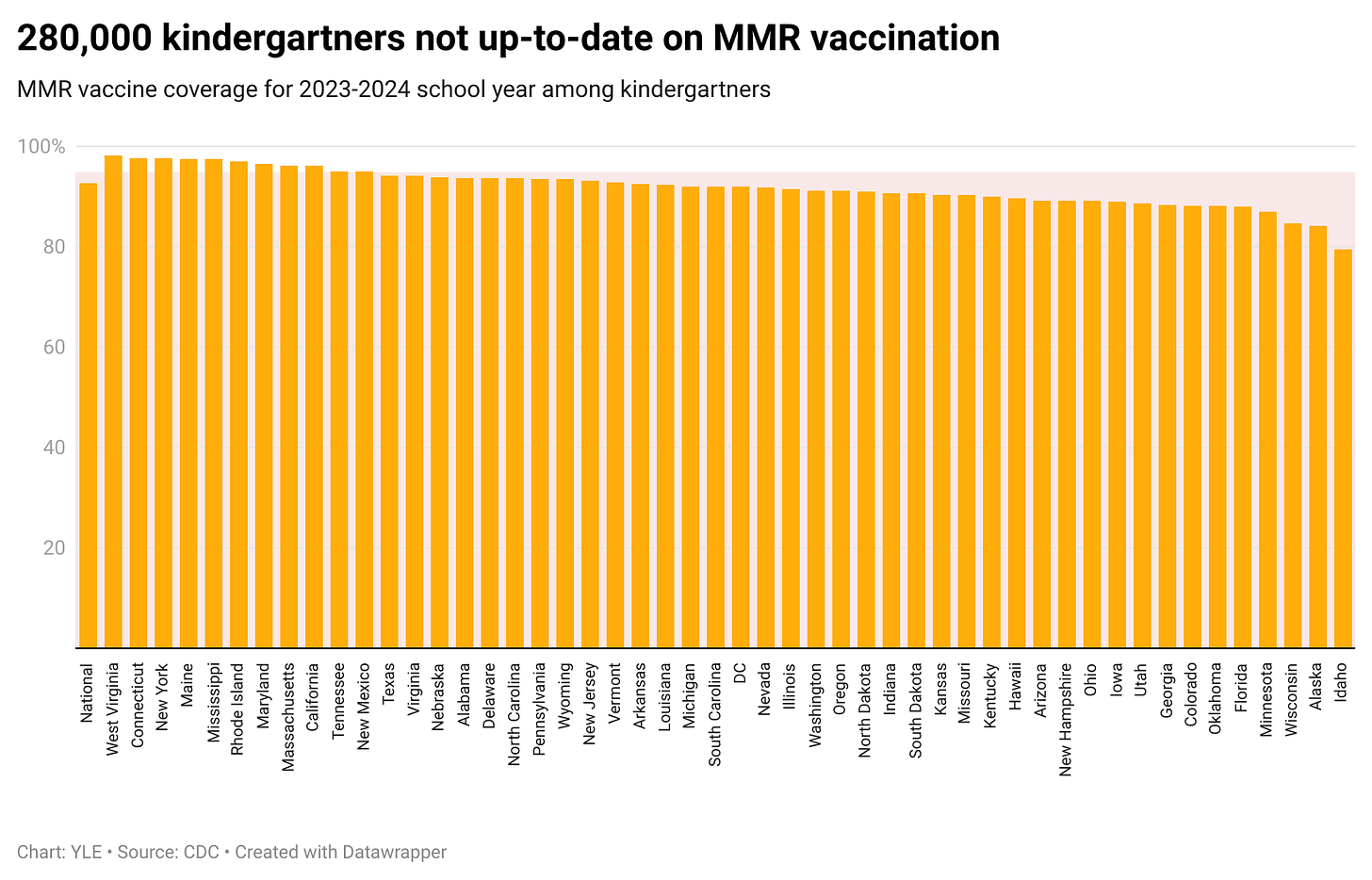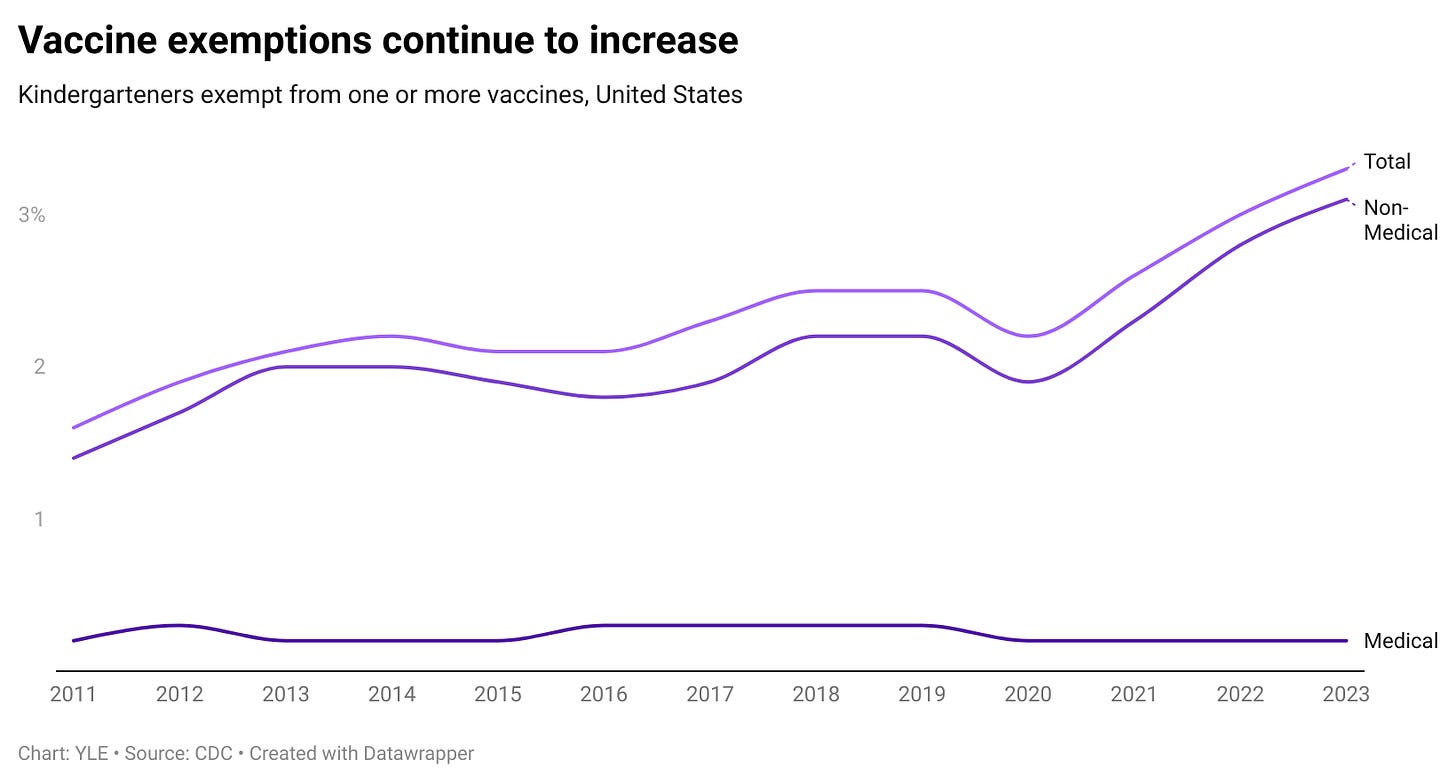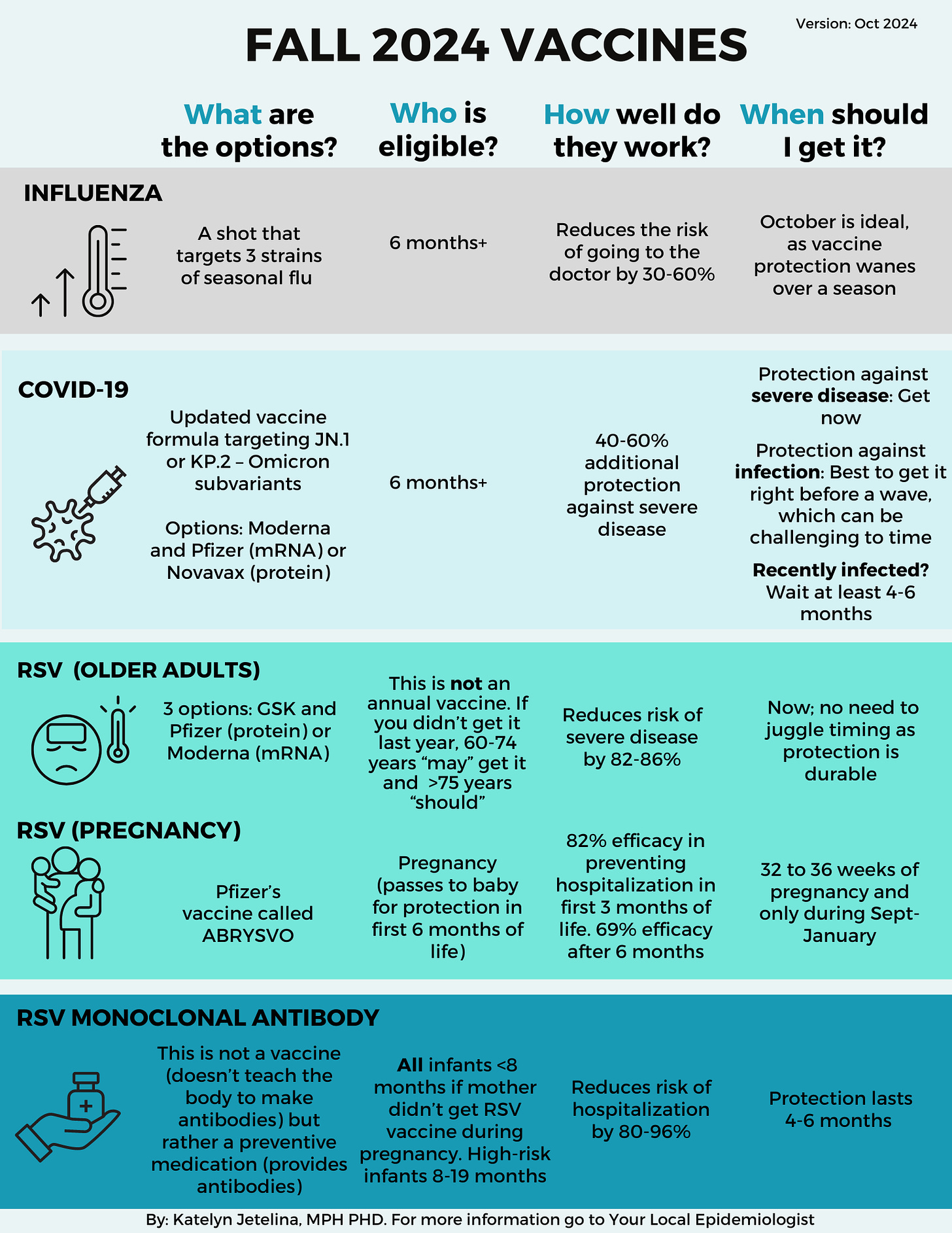The Dose: This week's public health explained (Oct 11)
A note to you. Plus, free Covid-19 tests, obesity rates declining, bad news on routine vaccination trends, and important information about flu vaccines.
Buckle up! I'm catching you up on the latest public health information, given that we paused for the mini-series. There is lots of good news (some bad news) and some important information for you.
But first, a note from me
270,000 of you are still here. Thank you for hanging in here for the mini-series on losing trust in vaccines through the Covid-19 pandemic.
The mini-series made a lot of people uncomfortable. After being on the frontline for the past 5 years (and the trauma, PTSD, the receiver of hate, and risk to my personal safety), it’s tough to write, edit, and even harder to admit mistakes or read negative reactions. But being uncomfortable is the point. If we don’t look in the mirror, we will never rebuild trust and move the needle forward for a healthier society. This means challenging our perspectives, becoming vulnerable, and having tough conversations.
I applaud Kristen for her courage in cleaning the wounds so they can heal.
While misinformation certainly sows distrust, distrust also sows misinformation. We need to work on this problem from both ends. We do this through empathy, listening, addressing needs on the ground, equipping trusted messengers, and being very clear about where values overlap with data.
Now, your “weather” report for the week
Covid-19 is nosediving, and flu and RSV are still at bay. Enjoy the lull before this season starts heating up again.
Free Covid-19 tests are now available!
You can now go HERE to order your 4 free Covid-19 at-home tests. USPS will deliver them to your mailbox in a matter of days.
In related news, FDA authorized the first Covid/flu combo test outside of emergency use (Healgen Rapid Check COVID-19/Flu A&B Antigen Test).
Two things to note about tests:
Expiration dates. Your test may have a printed expiration date already passed, but most tests have extended expiration dates. Before throwing it out, check here to see if your test’s expiration date is extended.
I’m testing differently these days, given that we are in a different place with Covid-19. My kids are always sick from school and daycare, so I don’t test every time they have the sniffles. I keep them home if they have a fever and/or are lethargic. When they are feeling better, I send them back. I will test them for Covid-19 if we are going to visit their great-grandparents.
Reply to this email if you have more questions about testing. I think this may deserve a full post next week.
Good news: Obesity rates are declining
In much welcome news, FT reported that obesity rates are declining in the United States after a 30-year increase!
Is this due to obesity drugs? Maybe. It would make sense—these drugs started getting popular at around the same time and are remarkably effective. But correlation doesn’t equal causation. Dr. Jen Dowd made some great points:
The decline is not statistically significant. In other words, we don’t know with certainty that this is “truly” decreasing. The data comes from a national survey, which is great, but has a small sample size that cannot precisely detect small trend changes like this.
If we examine who is losing weight, the number of people with severe obesity is increasing.
Only 6% of Americans are using these drugs. This may (or may not) be enough to bend the curve.
I’m cautiously optimistic, but time will tell if and when these drugs drive transformational change at the population level.
Curious about these weight-loss drugs? Science is coming out like a firehose. Check out this YLE post that may answer some of your questions.
U.S. continues to move backward on routine vaccinations
This week, the U.S. got terrible news: routine vaccination coverage among kids continues to slip. Data from last school year shows more than 280,000 kindergartners are unvaccinated against MMR (measles/mumps/rubella; up from 250,000 the year before).
38 states are below the herd immunity threshold (95%) for measles.
Idaho has the worst coverage at 79%.
In similar news, vaccine exemptions continue to increase, driven by non-medical exemptions (like those for philosophical reasons).
If we let this continue, vaccine-preventable diseases like measles and whooping cough will become a new reality for our kids. The loss of trust in vaccines is truly horrific, and there are a lot of things we should be doing to reverse this.
Flu vaccine may not be as effective this year
It’s important to get flu vaccines this fall. They will help prevent severe disease. And be sure to get yours before Halloween.
However, they may not be as effective this year. Data from the Southern Hemisphere suggests that this year’s flu vaccines aren’t a great match with the circulating flu strains: they offer 34% efficacy against hospitalization (lower than last year’s 50%).
Selecting vaccine strains for rapidly changing viruses, like flu, is both an art and a science. We must make an educated guess months before the fall season to manufacture vaccines in time. Thus, the vaccine formula doesn’t always align perfectly with the circulating virus.
I updated the YLE vaccine one-pager to capture the uncertainty of effectiveness. Paid subscribers can download the PDF at the end of the newsletter.
Public health needs more support
Epidemiologists got good (and bad) news from a workforce report this week:
Good: The number of epidemiologists this year increased. Yaya!
Bad: Due to federal funding cuts, states anticipate losing ⅕ their epidemiology workforce next year.
Bad: Funding is less diversified—fewer states are funding public health.
This will hurt public health’s ability to protect you from current and emerging health threats, which only increase with time. There are things you can do to change this, whether you are a policymaker, funder, health department leader, academic partner, or work in other key sectors.
Caitlin Rivers’s new book is out
This is a shameless plug for one of my dearest friends, Dr. Caitlin Rivers, an epidemiologist at Johns Hopkins and author of a new book out this week. Caitlin isn’t your typical scientist—she can communicate in plain language really well.
Her book—Crisis Averted— provides a unique under-the-hood look at public health and the associated challenges in the modern day. Her storytelling and ability to connect emotion and values to public health’s “invisible shield” is paramount. My two favorite chapters:
Truth-telling: “Those who occupy positions of authority must retain the public’s trust. The way to do that is to distort nothing, to put the best face on, to try and manipulate no one.”
Politics: We need to lean into politics in a nonpartisan manner.
Go order her book. Then maybe she can buy me a drink :)
Poll
See the answer below! And what it may mean to you…
Bottom line
You’re now caught up on public health nuggets for the week! Have a great weekend.
Love, YLE
Poll answer: A facility in North Carolina that produces 60% of the nation’s IV solutions was forced to close after Helene. Adding fuel to the fire, the nation’s second-largest supplier of IV was in Hurricane Milton’s path. This may become a huge problem, as IV solutions are used not only to rehydrate people but also form a critical component of almost every IV medication we give. This may mean your elected surgery will be delayed, for example.
Below is a PDF of the updated fall vaccine one-pager for paid subscribers. Feel free to print, disseminate, or doodle on it!









